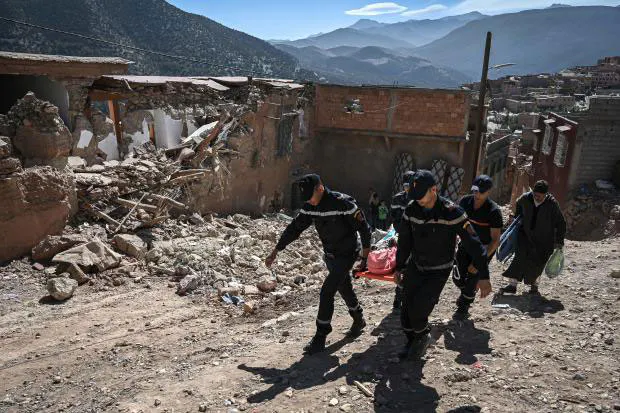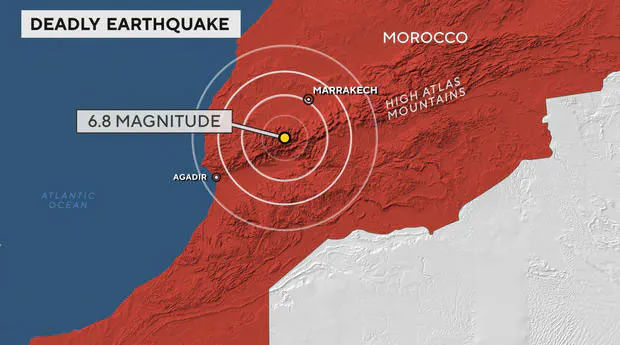Rise From The Rubble: Locals In Mourning Help Morocco As Earthquake Claims 2,800+ Lives
At least 2,862 people died from the earthquake, Morocco's Interior Ministry said Monday. Over 2,500 were injured. As the search for survivors of Friday's deadly earthquake intensifies in Morocco, it's a race against time and dangerous work.Tuesday, September 12th 2023, 4:55 am
At least 2,862 people are dead and thousands more injured in Morocco after a 6.8 magnitude earthquake devastated parts of Marrakech and communities south of the major city on Friday.
The earthquake was a magnitude 6.8, which is rare for western Morocco, according to the U.S. Geological Survey. Twenty minutes after the main earthquake, a magnitude 4.9 aftershock hit the region.
Frantic efforts to find those buried in the rubble are still ongoing as the death toll is expected to climb.
Mourning for Morocco
Locals in the Sacramento area are mourning their loved ones who died in the earthquake, including an Elk Grove family with heavy hearts on Monday.
Lahoucine Lhamous moved to the United States nearly 30 years ago, but his entire extended family remains in his home country of Morocco, most living at the base of the hard-hit High Atlas Mountains and higher up in small, mountain villages.
"There's some villages nearby that disappeared," said Lhamous. "They are gone forever."
He lost five family members and even more friends in the earthquake.
"You have to live another day. It's not easy," said Lhamous, a 15-year Elk Grove resident.
He and his wife Lysa Munson visit his family in Morocco every year and are heartbroken to see the images coming out of the country.
 Image Provided By: CBS News
Image Provided By: CBS News
"That culture and these people have been there for thousands of years. There's a lot of forces working against them and preserving that way of life. We don't want this earthquake to be the death knell to that," said Munson.
"I'm afraid it will be," added Lhamous.
Their surviving family members are on the ground in the High Atlas Mountains getting resources to remote villages.
"They're hard to get to. So they don't usually get the attention," said Munson.
Munson and Lhamous are now rallying their community to help their friends and family keep their efforts going.
The couple has already raised nearly 7,000 dollars in a GoFundMe online as of Monday night to get resources right to those communities.
"They're just incredibly generous people. They deserve some generosity when they are in need," said Munson.
Rising from the rubble
Many international agencies have boots on the ground in Morocco tackling today's crisis and what could lie ahead.
"This is a 6.8 magnitude. Aftershocks could be bigger than the first one and cause more damage, too," said Dr. Kit Miyamoto, structural engineer.
He is the CEO of Miyamoto International, a global company that is headquartered in West Sacramento, CA.
The company is comprised of teams of expert structural engineers who are dispatched to disaster.
Now, with a mission in Morocco.
"How to repair back better so they can go back to their houses quickly. That is going to be the main focus of our mission," said Miyamoto. "Not only the immediate response but the recovery and the reconstruction phase."
He himself will fly to the African country by Saturday to help lead his on-the-ground teams.
Miyamoto says officials estimate around 400,000 people are left homeless due to the quakes damaging or collapsing their homes.
The task ahead will take years, but it is one he and his team take on proudly.
Miyamoto Relief accepts donations to keep their non-profit engineering work going.
Morocco earthquake death toll
At least 2,862 people died from the earthquake, Morocco's Interior Ministry said Monday. Over 2,500 were injured.
How strong was the earthquake in Morocco?
The earthquake was a magnitude 6.8, which is rare for western Morocco, according to the U.S. Geological Survey. Twenty minutes after the main earthquake, a magnitude 4.9 aftershock hit the region.
In 1960, between 12,000 and 15,000 people were killed when a 5.9 magnitude earthquake struck western Morocco's coastal region. No earthquakes of magnitude 6 or larger have been recorded within 300 miles of Friday's quake, according to the agency, which has records for the area dating back to 1900.
In the northern part of the country, a magnitude 6.3 earthquake struck in 2016. In 2004, a magnitude 6.4 quake hit the region.
Morocco earthquake map
 Image Provided By: CBS News
Image Provided By: CBS News
Morocco is located in northwestern Africa with coastlines along the Atlantic Ocean and the Mediterranean Sea. Across the Strait of Gibraltar to the north are Spain and the British colony of Gibraltar. To Morocco's east is the country of Algeria.
Damage from the earthquake stretched from the city of Marakech south to villages in the Atlas Mountains, where the epicenter of the quake was located.
Where was the earthquake in Morocco?
The earthquake struck near the town of Oukaïmedene in the Atlas Mountains, a rural area about 50 miles southwest of Marrakech, according to the USGS.
The quake had a depth of about 16 miles, which the agency considers to be relatively shallow. Shaking was reported throughout the country as well as in Algeria, Portugal and Spain.
When did the Morocco earthquake happen?
The earthquake struck at 11:11 p.m. local time on Friday, according to the USGS. The country is one hour ahead of Greenwich Mean Time, so the quake hit at 6:11 p.m. EDT.
The quake struck at a time when most families and children would have been home in bed, the U.N. children's agency, UNICEF, noted.
What caused the Morocco earthquake?
According to the USGS, the earthquake was the result of oblique reverse faulting. As Jesús Galindo-Zaldivar, a professor of geodynamics at Universidad de Granada, told The Conversation, the phenomenon happens when tectonic plates collide, causing stress to build on a fault line as the Earth's crust thickens. When rocks abruptly shift to release the stress, it can cause an earthquake.
How to help
Donations can be made to the following organizations to help victims of the earthquake in Morocco:
More Like This
September 12th, 2023
November 21st, 2024
November 20th, 2024
Top Headlines
January 3rd, 2025
January 3rd, 2025
January 3rd, 2025
January 3rd, 2025











